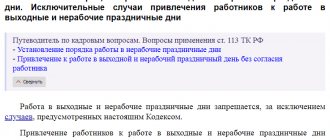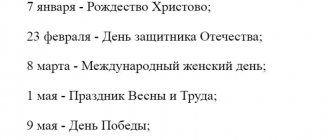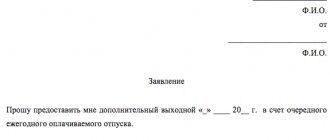What is a day off
Days off are required by law to be provided to all workers as a form of uninterrupted weekly rest. However, the answer to the question of how many days off should be provided may vary.
In the case of a five-day working week, the law provides for two days off between weeks, and in the case of a six-day week, one.
The law establishes one general day off - Sunday. The second day off can be established in a collective agreement or in internal rules (orders). A timesheet of working days and weekends will help you better navigate your schedule.
If it is impossible to suspend the functioning of the enterprise on generally accepted days off due to production and other conditions, days off may be provided on other days of the week to different groups of employees in turn - the regulations are approved in the internal regulations by order.
Are there time restrictions on being hired to work on weekends?
author of the answer,
Question
Is there a limit on the number of hours you can work on a weekend? two days off in a row? number of days per year?
Answer
Labor legislation does not establish restrictions on the number or frequency of attracting workers to work on weekends (including the number of attracting workers to work on weekends per year or any frequency).
Rationale
According to Art. 111 Labor Code of the Russian Federation
All employees are provided with days off (weekly uninterrupted rest). With a five-day work week, employees are given two days off per week, and with a six-day work week - one day off.
Work on weekends and non-working holidays is prohibited, except in cases provided for by the Labor Code of the Russian Federation.
As a general rule, work on weekends and non-working holidays is prohibited, except in cases provided for by the Labor Code of the Russian Federation ( Part 1 of Article 113 of the Labor Code of the Russian Federation
).
This article establishes cases when it is permissible to engage an employee to work on weekends and non-working holidays without his consent ( Part 3 of Article 113 of the Labor Code of the Russian Federation
), with the written consent of the employee (
Part 2 of Article 113 of the Labor Code of the Russian Federation
), with the written consent of the employee and taking into account the opinion of the elected body of the primary trade union organization (if any) (
Part 5 of Article 113 of the Labor Code of the Russian Federation
).
Involvement of employees to work on weekends and non-working holidays is carried out with their written consent if it is necessary to perform unforeseen work, on the urgent implementation of which the normal work of the organization as a whole or its individual structural divisions or an individual entrepreneur depends in the future.
Involving employees to work on weekends and non-working holidays without their consent is permitted in the following cases:
1) to prevent a catastrophe, industrial accident or eliminate the consequences of a catastrophe, industrial accident or natural disaster;
2) to prevent accidents, destruction or damage to the employer’s property, state or municipal property;
3) to perform work the need for which is due to the introduction of a state of emergency or martial law, as well as urgent work in emergency circumstances, that is, in the event of a disaster or threat of disaster (fires, floods, famine, earthquakes, epidemics or epizootics) and in other cases, threatening the life or normal living conditions of the entire population or part of it ( Article 113 of the Labor Code of the Russian Federation
).
Article 153 of the Labor Code of the Russian Federation
Guaranteed increased pay for work on weekends and holidays.
When establishing working hours for an employee and drawing up work schedules, the employer must comply with the provisions of Art. 110 Labor Code of the Russian Federation
on the minimum duration of weekly uninterrupted rest. At the same time, in our opinion, the employer has the right to involve the employee in work on weekends, despite the fact that he does not comply with the above requirements regarding the duration of weekly uninterrupted rest.
Labor legislation does not establish restrictions on the number or frequency of employees being hired to work on weekends.
Restrictions are provided for
in Part 6 of Art.
99 of the Labor Code of the Russian Federation , according to which the duration of overtime work should not exceed 4 hours for each employee for two days in a row and 120 hours per year.
However, these restrictions on work on weekends and holidays do not apply ( Decision of the Supreme Court of the Russian Federation dated May 21, 2010 N GKPI10-182
).
Thus, labor legislation does not establish restrictions on the number or frequency of attracting workers to work on weekends (including the number of attracting workers to work on weekends per year or any frequency).
| She answered the question: I.V. Tarasova, leading expert at Consultant + Askon |
General holidays
The duration of days off as continuous rest should not be less than 42 hours per week. This rule is mandatory for compliance in any organization and should not depend on organizational and legal forms when planning shift schedules and working modes. For orientation, a time sheet is provided in the schedule.
The duration of weekly continuous rest is determined from the end of work activity on the eve of the day off until the continuation of work activity on the day following the day off. Determining the length of the weekend may depend on the work schedule and shift schedules.
Moreover, rest, in addition to time for sleep, also implies a certain time period that workers can use at their own discretion. According to the International Labor Organization, rational use of free time while providing employees with the opportunity to realize their own interests allows increasing labor productivity indicators.
Thanks to proper rest on weekends, the work process can become as efficient as possible.
The scientific and social approach to establishing the time of weekends is currently widely used in developed countries, where the duration of working days is determined by law. In the Russian Federation, the regulations on weekends are established by Article 111 of the Labor Code of the Russian Federation. The clauses of this article guarantee the provision of days off to all categories of workers.
The length of the working week is regulated by the working regime:
- 5 days with 2 days off;
- 6 days with 1 day off;
- with the provision of days off according to a sliding schedule.
The length of the working week must be established in the collective agreement or internal regulations.
According to Part 2 of Article 111 of the Labor Code of the Russian Federation, the general day off is Sunday. The second day off for a 5-day work week in this case should be established in the local regulations of the organization.
According to the principles of providing employees with continuous free time, the employer must choose the order of days off taking into account the requirements of diverse industries, customs, abilities and skills of different categories of employees. This principle is enshrined in Part 3 of Article 111 of the Labor Code.
When defining the categories of working days and weekends, it is important to mention such a concept as non-working holidays.
Shift work schedule and how to arrange it
In Russian realities, working 8 hours a day is a legally regulated norm. In some cases, processing is possible, but most organizations, regardless of whether it is a factory or a bank, prefer this schedule. But there are a number of organizations that prefer a shift schedule. What it is, when it is used, how it is regulated by law and how to create a shift schedule you will find out below.
- When drawing up a schedule, you need to remember that pregnant women, teenagers, disabled people, and other preferential categories of citizens cannot be involved in the night shift;
- Everyone except teenagers, by their consent, can be involved in night shift work;
- Night shifts are paid 20+% more than day shifts, as working conditions are not considered normal.
Non-working holidays
Each country has a certain range of public holidays during which the population cannot be recruited to work. In different countries, the definition of holidays as non-working days is regulated in its own way. Most often, the dates of official holidays are fixed in general regulations.
In the Russian Federation, the range of holidays of national significance is defined in Article 112 of the Labor Code of the Russian Federation. Taking into account all the changes made, the list of non-working holidays includes New Year holidays, Christmas, Defender of the Fatherland Day, International Women's Day, Spring and Labor Day, Victory Day, Russia Day and National Unity Day.
If a day off and a non-working holiday coincide, then the Labor Code of the Russian Federation provides for the transfer of the day off to the working day following the holiday.
How to correctly reflect the working hours according to the schedule - a day after three
1. In accordance with part one of Art. 100 of the Labor Code of the Russian Federation, the working time regime must provide for the duration of the working week (five-day with two days off, six-day with one day off, work week with days off on a sliding schedule, part-time work week), work with irregular working hours for certain categories of workers, duration daily work (shift), including part-time work (shift), start and end times of work, time of breaks in work, number of shifts per day, alternation of working and non-working days, which are established by internal labor regulations in accordance with labor legislation and other regulatory legal acts containing labor law norms, collective agreements, agreements, and for employees whose working hours differ from the general rules established by a given employer - an employment contract.
The concept of time off and dismissal on a day off
Time off is time for employees to rest, provided to them as compensation for being involved in work activities outside of working hours. For working on a general day off, you must be given time off in the next two weeks. If it is impossible to provide time off, work performed on a general day off must be compensated with a payment, calculated in double amount.
Also, time off can be provided if the employee wishes if the standard working time per month is exceeded instead of additional payment.
Dismissal on a weekend can be carried out if an employee falls ill, and the day of his dismissal, according to a written application, falls on a weekend. However, more often the dismissal is carried out on the last working day, even if the actual date of dismissal falls on the next day off.
Are there working hours standards for the day-night-bedtime-weekend schedule?
I work at a factory as a driver on a schedule of 12 days 12 nights off. Due to the shortage of drivers after layoffs, the bosses force me to work on weekends or even two days or two nights in a row, for example 12 days 12 days 12 nights off and back to work or 12 days 12 nights 12 nights dump and again on the day, explaining this by production necessity. How legal is all this and are there working time standards for a day-night-night-off schedule? Let me make a reservation right away that these are not duty vehicles, but those employed in the main production process.
According to Art. 99 of the Labor Code of the Russian Federation » Overtime work is work performed by an employee on the initiative of the employer outside the working hours established for the employee: daily work (shift), and in the case of cumulative accounting of working hours - in excess of the normal number of working hours for the accounting period.
Days off for certain categories of workers
In addition to general days off, the law provides for other days off, which are provided to certain categories of workers using different calculation methods. Their number may vary.
For example, if it is necessary to care for disabled children, one of the parents or guardians and trustees of the child is provided with additional non-working days in the amount of four days per month when submitting an application in the prescribed form. For women working in rural areas, upon written request, they may provide an additional unpaid day off per month.
If one of the parents (guardians, trustees) works in the Far North, as well as areas equivalent to this area, if there is a child under 16 years of age and the need for care, he may be given an additional unpaid day off every month.
Author of the article
Shift work schedule: 2 days, day off, 2 nights, rest day and 2 days off
I work two nights in a row for 12 hours.. Two days at home.
My heart is heavy in the morning, it feels like I was running. You come home straight to bed. You won’t sleep for a long time. Three, four hours.. And then you feel exhausted. Recently, one woman was taken away from work in an ambulance; her blood pressure often rises. It seems like a normal schedule to me. I worked for two days, then a day off and then the next evening I went to work for two nights, then a night off and one day off. That is, clearly two/two, 15-16 work shifts per month, including night shifts. And you end up working for two days, then have a day off, go into the night the next day, and then count three days off. That is, there are 14 work shifts per month? But the work is physical, it’s packing some kind of crap all night, it’s terrible.
Conditions
Hiring is possible if work needs to be done urgently.
No one could have predicted the occurrence of these circumstances in advance. The subsequent functioning of both the enterprise as a whole and its structural units separately depends on the result of a person’s exit. The person must agree to go out on weekends and holidays. He cannot do this orally, since a document sent to the boss is required.
On this basis, the employer attracts subordinates to work, taking into account the opinion of the trade union. But this is not an imperative norm of law. This is due to the fact that not all enterprises and companies have this elected body.
Art. 153 of the Labor Code of the Russian Federation, as amended in 2021, indicates exceptional cases when a person may be involved in work during periods of legal rest:
- preventing a catastrophe, accident, natural disaster, or eliminating the causes of what happened;
- prevention of accidents at work, damage to property owned by both the company and municipal or federal authorities;
- performing duties the necessity of which is determined by the fact that a state of emergency and martial law has been introduced in a certain territory;
- performing duties if they cannot be postponed due to the threat of a disaster, or in conditions where it has already occurred (fires, floods, epidemics, etc.).
In the above situations, the employer is not obliged to obtain written consent from his subordinates!
The circle of workers who can be involved in work on vacation
These are employees who are part of the company's staff. The boss has the right to ask employees to come to work on these days:
- disabled people;
- employees who have dependents under 3 years of age (if they returned from maternity leave earlier than specified in the law).
But this is allowed if these citizens are not prohibited from working due to health reasons certified by a document. This must be a certificate from a medical institution. At the same time, the legislator emphasizes that this category of workers has the right to refuse the employer’s offer upon signature.
Compensation
Articles 152 and 153 of the Labor Code of the Russian Federation regulate the issues of employee leave on weekends, as well as the procedure for compensation from the employer. Workers are offered two options to choose from:
- Increased exit payment.
- Time off according to the Labor Code.
If the employee’s return to work was accompanied by his consent in writing, then the type of compensation should be specified in it. If recruitment took place without paperwork, then employees are usually paid increased wages.
When an employee chooses compensation in cash equivalent, exit is paid double.
Calculation of payments for weekends
The calculation is made depending on the system adopted by the enterprise regarding the calculation of personnel wages:
- Piece work : the corresponding prices are used, doubled.
- Using monthly salaries with time-based payment : an additional payment is made to the employee’s official salary in the amount of the daily tariff rate.
- Time-based wages at a rate per hour or per day : the rate is doubled.
The minimum wage limit for performing work duties on rest days is established separately for the category of workers: piece workers and time workers. The type of system by which labor is paid is taken into account (by the hour, by the day, by the month). And this limit is established by the Labor Code of the Russian Federation. Additions to this system can be established by labor and collective agreements. The law does not prohibit this.
A more precise amount of payment is established according to Part 2 of Art. 153 of the Labor Code with comments, this point is reflected in the contracts:
- collective (at the enterprise it may not be concluded, it all depends on the specifics of the work);
- labor certificate (its conclusion is mandatory when hiring a person for official employment);
- a local act adopted by the enterprise.
If these acts do not provide for the above cases, payment is made according to the Labor Code of the Russian Federation. You should rely on the norms of Article 153, which indicates a double amount of remuneration for an employee’s work.
The main thing that an employee must do when choosing compensation is agreeing with the boss on its type. If, for example, a person decides to take a day off, then this issue is resolved with senior management. Otherwise, absenteeism may be considered a violation of labor laws.
It does not matter how much time a person actually worked on a holiday or day off. They must give him a whole day as compensation. The legislator proceeds from the logic of Part 3 of Art. 153 of the Civil Code of the Russian Federation, that, having gone to the place of work, the employee missed the whole day of his legal day off. But the employer is not obliged to pay for an additional compensation day!
Creative category
Special rules regarding remuneration are established for the creative category. These include:
- media representatives involved in creative projects;
- organizations of citizens involved in television and video filming;
- theater troupe;
- circus communities;
- athletes (professional).
The peculiarity of their activities is that filming, performances, and concerts take place on weekends and holidays. But they are also subject to the Labor Code of the Russian Federation. Based on this provision, Art. 153, part 4 of the Labor Code of the Russian Federation establishes that increases in wages for this category of citizens on days (rest days) are also established by contracts. But labor relations are not limited to the minimum amount for paid days off.








